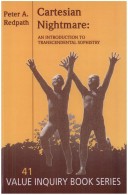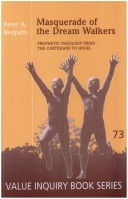Value Inquiry Book Series / Studies in the History of Western Philosophy
3 primary works
Book 41
This book challenges the presupposition among professional philosophers that Rene Descartes is the Father of Modern Philosophy. It demonstrates by intensive textual analysis of Descartes's Discourse and Meditations that he inaugurated a new type of sophistry rather than a new way of conducting philosophy. Transcendental Sophistry is a synthesis of Renaissance humanism and Christian theology, especially the theology of creation. This striking re-evaluation of the achievement of Descartes opens the history of Western philosophy to radical reinterpretation.
Book 46
This book establishes that the ancient Greeks had a prevailing method of doing philosophy which was rooted in philosophical realism. Through extensive historical and philosophical analysis, it demonstrates that this method was challenged in ancient times by an apocryphal notion of philosophy which eventually became confused with philosophical reasoning, and was passed on to posterity through the work of Christian theologians until it was called into question by leading thinkers of the thirteenth century. It shows how this thirteenth-century challenge influenced the growth of the Renaissance humanist movement and how this movement, in turn, passed on to modernity the same apocryphal notion of philosophy as a rhetorical theology of allegorical prefiguration.
Book 73
Through extensive textual analysis, this book concludes that the prevailing opinion about the nature of modern and contemporary philosophy is wrong. It maintains that almost all modern and contemporary philosophy is deconstructed, secularized, Augustinian theology, not philosophy. The work is divided into eight chapters, a guest Foreword by Herbert I. London (President of the Hudson Institute and Olin Professor of Humanities at New York University) notes, bibliography, and an index. Chapter 1 (Protagoras Sees the Ghost of Hippo) considers Cartesian thought, Hobbes, and Newton. Chapter 2 (I Feel the Spirit Move Me) examines Locke, Berkeley, and Hume. Chapter 3 (The Urge to Emerge) investigates Lessing and Rousseau. Chapters 4 (To Dream the Impossible Dream) and 5 (Wake Up, Wake Up, You Sleepyhead) treat Kant. Chapters 6 (I Am Music) and 7 (Looking for God in All The Wrong Places) deal with Hegel. Chapter 8 (Dirty Dancing: Higher Education as Enlightened Swindling) concludes that a lack of philosophical and historical experience coupled with a widespread inability to read philosophical texts according to the intention of the author (1) causes us to mistake secularized theology for philosophy and (2) is a main cause for the decline of contemporary universities.


